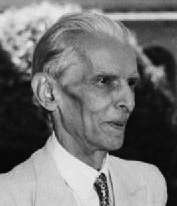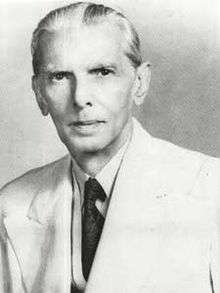Fourteen Points of Jinnah
The Fourteen Points of Jinnah were proposed by Muhammad Ali Jinnah as a constitutional reform plan to safeguard the political rights of Muslims in a self-governing India. In 1928, an All Parties Conference was convened to solve the constitutional problems of India. A committee was set up under MotiLal Nehru. That committee prepared a report which is known as "Nehru Report". This report demanded "Dominion Status" for India. Separate electorates were refused and the reservation of seats for the Muslims of Bengal and Punjab was rejected. In this report, not a single demand of the Muslims was upheld. Since Nehru Report was the last word from Hindus therefore Mr. Jinnah was authorized to draft in concise term the basis of any future constitution that was to be devised for India Jinnah's aim was to get rights for Muslims. He therefore gave his 14 points. These points covered all of the interests of the Muslims at a heated time and in this Jinnah stated that it was the "parting of ways" and that he did not want and would not have anything to do with the Indian National Congress in the future. The League leaders motivated Jinnah to revive the Muslim League and give it direction. As a result, these points became the demands of the Muslims and greatly influenced the Muslims' thinking for the next two decades till the establishment of Pakistan in 1947.
| ||
|---|---|---|
Parties Tributes Gallery: Picture, Sound, Video |
||
Background
The report was given in a meeting of the council of the All India Muslim League on 9 March 1929. The Nehru Report was criticised by Muslim leaders Aga Khan and Muhammad Shafi. They considered it as a death warrant because it recommended joint electoral rolls for Hindus and Muslims.[1]
Muhammad Ali Jinnah left for England in May 1928 and returned after six months. In March 1929, the Muslim League session was held at Delhi under the presidency of Jinnah. In his address to his delegates, he consolidated Muslim viewpoints under fourteen items and these fourteen points became Jinnah's 14 points.[1][2]
The Fourteen Points
1: The form of the future constitution should be federal, with the residuary powers vested in the provinces.
2: A uniform measure of autonomy shall be guaranteed to all provinces.
3: All legislatures in the country and other elected bodies shall be constituted on the definite principle of adequate and effective representation of minorities in every province without reducing the majority in any province to a minority or even equality.
4: In the Central Legislature, Muslim representation shall not be less than one third.
5: Representation of communal groups shall continue to be by means of separate electorate as at present: provided it shall be open to any community, at any time to abandon its separate electorate in favour of a joint electorate.
6: Any territorial distribution that might at any time be necessary shall not in any way affect the Muslim majority.
7: Full religious liberty, i.e. liberty of belief, worship and observance, propaganda, association and education, shall be guaranteed to all communities.
8: No bill or resolution or any part thereof shall be passed in any legislature or any other elected body if three fourths of the members of any community in that particular body oppose it as being injurious to the interests of that community.
9: Sindh should be separated from the Bombay Presidency.
10: Reforms should be introduced in the North West Frontier Province and Balochistan on the same footing as in the other provinces.
11: Muslims should be given adequate share, along with the other Indians, in all the services of the state.
12: The constitution should embody adequate safeguards for the protection of Muslim culture and for the protection and promotion of Muslim education, language, religion, personal laws and Muslim charitable.
13: No cabinet, either central or provincial, should be formed without there being a proportion of at least one-third Muslim ministers.
14: No change shall be made in the constitution by the Central Legislature except with the concurrence of the States constituting the Indian Federation.
Reactions
Among the Hindus, Jinnah's points were highly disregarded and were rejected by the Congress Party. Jawaharlal Nehru referred to them as "Jinnah's ridiculous 14 points". This eventually led Jinnah to form Pakistan.[3]
Aftermath
After the fourteen points were publicized, Jinnah was invited to attend the round table conferences, where he forwarded the Muslim point of view.[2][4]
References
- "History of India(from National Movement To Present Day) – N. Jayapalan – Google Books". Books.google.co.uk. Retrieved 19 February 2013.
- "Jinnah, Pakistan and Islamic Identity: The Search for Saladin – Akbar S. Ahmed – Google Books". Books.google.co.uk. 28 December 1928. Retrieved 19 February 2013.
- "Encyclopaedia Eminent Thinkers (vol. 13 : The Political Thought of M.A. Jinnah) – Jai Narain Sharma – Google Books". Books.google.co.uk. Retrieved 19 February 2013.
- "Indian History – Google Books". Books.google.co.uk. Retrieved 19 February 2013.


